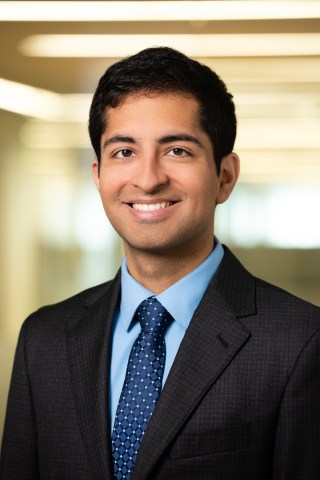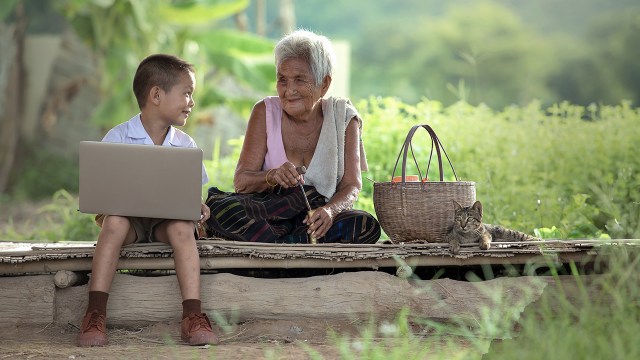
The vast majority of the world’s Buddhists live in the Asia-Pacific region, and Buddhism is a major part of culture and identity in many Asian societies.
To further our understanding of Buddhism in Asia, we conducted surveys in 2022 and 2023 that asked Buddhists if someone can be considered “truly” Buddhist if they engage in – or do not engage in – certain practices.
Pew Research Center conducted this analysis to explore how Buddhists across Asia view Buddhism.
Data comes from two Pew Research Center projects. Data for Hong Kong, Japan, South Korea, Taiwan and Vietnam comes from a Center survey of 10,390 adults conducted from June 2 to Sept. 17 2023. Data for Cambodia, Malaysia, Singapore, Sri Lanka and Thailand comes from a Center survey of 10,551 adults conducted from June 1 to Sept. 4 2022. (The survey in South and Southeast Asia also included 2,571 interviews in Indonesia, but adequate sample size is unavailable to analyze Buddhist respondents there.)
Interviews were conducted over the phone in six places: Hong Kong, Japan, Malaysia, Singapore, South Korea and Taiwan. In Cambodia, Sri Lanka, Thailand and Vietnam, interviews took place face-to-face.
These surveys are part of the Pew-Templeton Global Religious Futures project, which analyzes religious change and its impact on societies around the world.
Respondents were selected using a probability-based sample design. Data was weighted to account for different probabilities of selection and to align with demographic benchmarks for the adult populations.
For more information, read the 2023 survey’s full list of questions and responses, the 2022 survey’s full list of questions and responses, and our survey methodology.
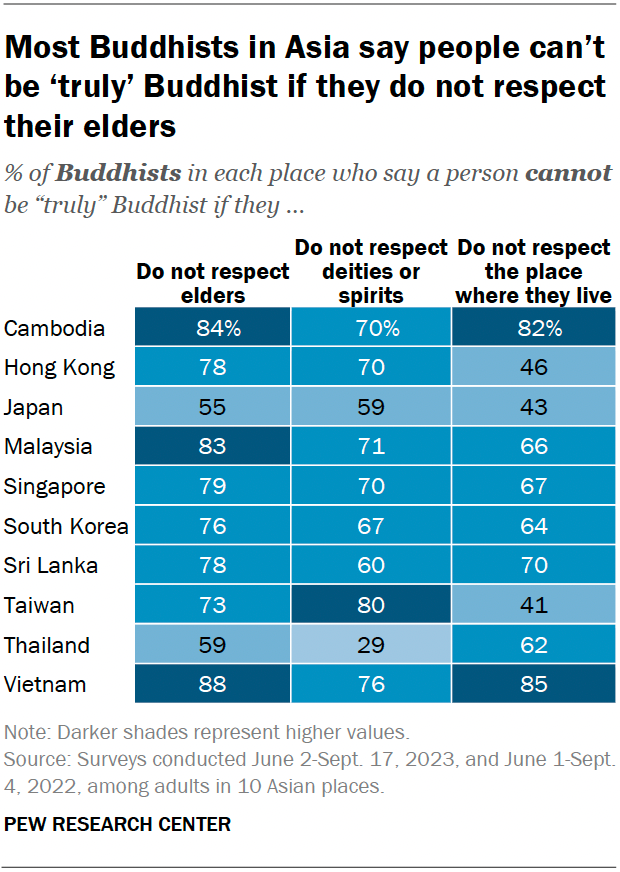
Overall, clear majorities of Buddhists in most places surveyed say you cannot be truly Buddhist if you do not respect elders. In Cambodia, Malaysia and Vietnam, at least eight-in-ten Buddhists hold this view.
Buddhists across the region also say that someone cannot be truly Buddhist if they do not respect deities or spirits. Most Buddhists in almost all places surveyed say this, including 80% in Taiwan and 76% in Vietnam.
In some places surveyed, Buddhists also see a need for people to respect their homelands to be considered truly Buddhist. For example, in Cambodia, Sri Lanka and Thailand – where Buddhism holds a special status under the national constitutions – most Buddhists say a person cannot be truly Buddhist if they do not respect Cambodia, Sri Lanka and Thailand, respectively.
This is also the majority view in some places, such as Vietnam and South Korea, where Buddhism does not hold a favored status under the constitution. But elsewhere in East Asia – including Hong Kong, Japan and Taiwan – fewer than half of Buddhists take this view.
Drinking alcohol, making offerings
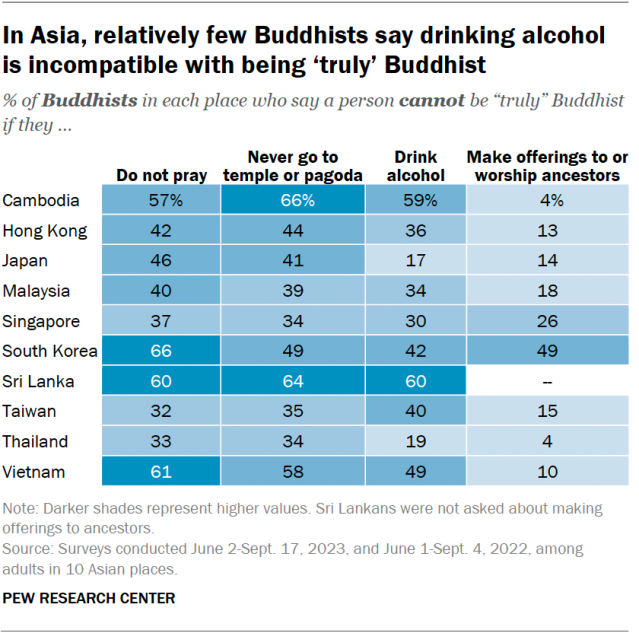
We also asked Buddhists in Asia if a person can be truly Buddhist if they:
- Do not pray
- Never go to temple or pagoda
- Drink alcohol
- Make offerings to or worship ancestors
On balance, Buddhists are less likely to see these actions as disqualifying someone from truly being a Buddhist than they are to say the same about disrespecting elders or disrespecting deities or spirits.
For instance, fewer than half of Buddhists in most places we surveyed say drinking alcohol disqualifies someone from being Buddhist, including no more than two-in-ten in Thailand and Japan. Avoiding intoxicants, including alcohol, is one of the Five Precepts, a set of Buddhist teachings on morality for laypeople.
Cambodian, Sri Lankan and Vietnamese Buddhists stand out on several of these measures, however. In each of these countries, a majority of Buddhists say someone cannot be truly Buddhist if they do not pray or attend temple.
Celebrating other religions’ holidays
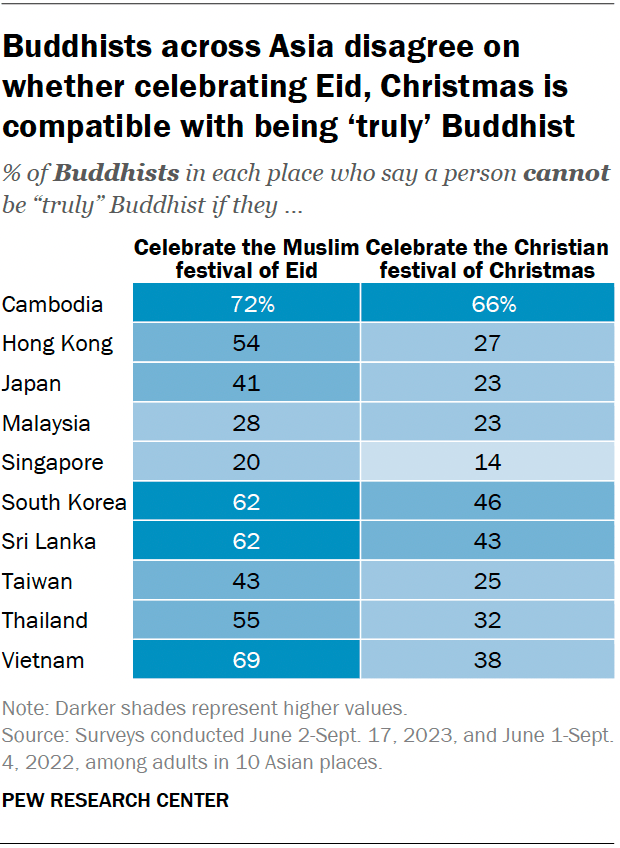
Buddhists in the region differ widely on whether the Muslim festival of Eid is compatible with Buddhism.
Around seven-in-ten Buddhists in Cambodia and Vietnam, for example, say celebrating Eid disqualifies someone from being truly Buddhist. But only 28% of Buddhists in Malaysia and 20% in Singapore share this view.
Buddhists in the region are generally more open to Buddhists celebrating Christmas. In almost all places surveyed, fewer than half of Buddhists say someone cannot be truly Buddhist if they celebrate Christmas.
Buddhists in Cambodia stand out on these questions. Sizable majorities believe celebrating Eid (72%) and Christmas (66%) disqualify someone from truly being a Buddhist.
Note: For more information, read the 2023 survey’s full list of questions and responses, the 2022 survey’s full list of questions and responses, and our survey methodology.
